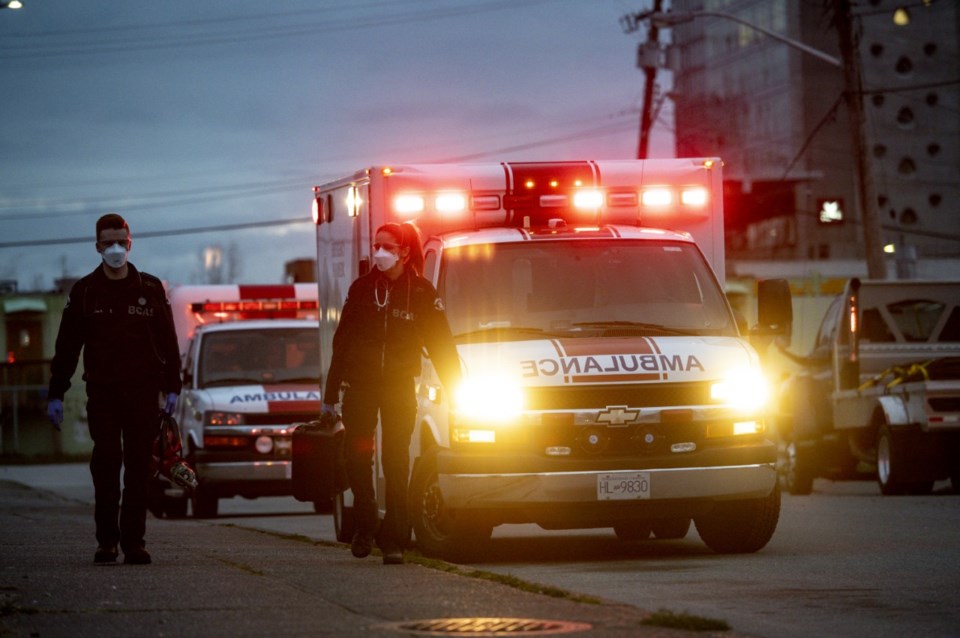Paramedics in B.C. are responding to a record number of calls – with 840,000 in 2021, up 90,000 from the previous year, according to their union.
Troy Clifford, president of Ambulance Paramedics of BC, called these numbers “staggering.”
Furthermore, there are many times when ambulances are out of service because they can’t be staffed.
Recently, during a peak shift, 50 ambulances out of 120 were out of service in the Lower Mainland, Clifford told the Richmond News.
Because of the shortage, paramedics end up covering each other’s territory, for example, Ladner might cover Richmond if Richmond ambulances are doing calls in Vancouver.
“On any given shift in the Lower Mainland including Richmond, we’re seeing 30 to 40 per cent of ambulances not staffed because there are not enough paramedics to work,” Clifford said.
In 2018, ambulance paramedics responded to 714,000 calls, in 2019, there were 723,000 and, in 2020, this number rose to 751,000.
BC Emergency Health Services, however, although showing increasing calls year-over-year, posted online that call volumes in 2021 were almost 554,000, up from about 525,000 in 2020.
Clifford said the number of calls in 2021 – 840,000 - were provided to them internally by BCEHS; meanwhile, BCEHS said there are different ways to report ambulance calls, for example, by event.
Often, more than one ambulance responds to a call.
Clifford pointed to the opioid crisis as just one of the areas where paramedics are seeing high call volumes – 2021 is expected to be a record number for overdose deaths due to drug poisoning with 1,782 recorded in the first 10 months alone.
Paramedics are reviving “dozens and dozens” of overdose patients every day, Clifford said.
“If it weren't for the work of our members, those numbers would be exponentially higher – without question,” he added.
According to BCEHS, overdose calls were up 31 per cent across the province in 2021 with BC Ambulance responding to 35,525 calls – about 21,000 of those were in the Lower Mainland and Fraser Valley.
During the heat dome in late June and early July, when about 600 people died in the province, paramedics were scrambling to get to calls.
Health Minister Adrian Dix vowed at that time to increase the number of paramedics, but Clifford told the Richmond News this hasn’t come to fruition yet, although discussions are on-going.
Dix also changed the governance structure of BCEHS and appointed Jim Chu, former Vancouver top cop, to head its board of directors.
He appointed Leanne Heppell as interim chief ambulance officer – this position was confirmed as permanent this week.
Heppell, who is a registered nurse, was previously the chief operating officer of acute care with Providence Health.
But Clifford pointed out getting more paramedics on the road will require more training, and he hopes the number of seats at the various private colleges that train them will be increased. (The government subsidizes some seats at these private institutions.)
Furthermore, he said wages and benefits need to be competitive with other areas of health care.
Some paramedics are leaving for other industries – like the oil and gas industry and Site C – because the pay is better.
“When you’re in a supply-and-demand for human resources – like a lot of professions are now and private sectors – you need to offer them something,” Clifford said. “We’ve lagged behind the other professions in public safety which is really hurting our ability to recruit people into this really great profession.”
The province noted 85 new full-time paramedics were hired in urban areas like Vancouver and Richmond – Richmond got one more full-time staffed ambulance in November at its 250 Station on Cambie Road.
There were also 30 new full-time dispatchers hired and 24 ambulance stations were converted from on-call staff to 24/7 staffed stations, and 26 smaller stations got more permanent, regular paramedics.
In December, E-Comm – which responds to 9-1-1 calls – made the decision to put some ambulance calls on hold so that its dispatchers could deal with police calls.
Oliver Gruter-Andrews, CEO of E-Comm, said these calls, because BC Ambulance couldn’t take them, were holding up serious police calls.
- with files from Castanet



